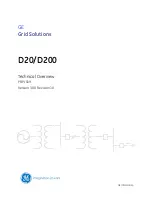
I/O Terminal /
OVERVIEW
11
2.3 PROFIBUS
DP
In PROFIBUS DP systems, a master (PLC, PC etc.) usually communicates with a large number
of slaves (I/Os, drives etc.). Only the master may here actively access the bus (send telegrams
on its own initiative), while a DP slave only sends telegrams when it is requested to do so by a
master.
DP StartUp
Before the master and slave can cyclically exchange data, the parameter and configuration data
is transmitted from the master to the slaves during the DP StartUp phase. After the parameter
and configuration data has been sent, the master interrogates the slave's diagnostic data until the
slave indicates that it is ready for data exchange. Depending on the extent of the calculations that
the slave must carry out after receiving the parameter and configuration data, it can take up to a
few seconds before it is ready for data exchange. For this reason the slave possesses the
following states:
Parameter Data
The parameter data is sent from the master to the slave in the SetPrmLock request telegram. The
SetPrmLock response telegram does not contain any data, and therefore consists of a single
byte, the short acknowledgement. The parameter data consists of DP parameters (e.g. the setting
of the DP watchdog or checking the IdentNumber (unique to each DP device)), of DPV1-/DPV2
parameters and of application-specific parameters that only have to be transmitted once during
the StartUp. If an error is found in the parameter data, this is indicated in the diagnostic data, and
the slave either remains in or enters the WAIT-PRM state.
Configuration Data
The configuration data is sent from the master to the slave in the ChkCfg request telegram. The
ChkCfg response telegram does not contain any data, and therefore consists of a single byte, the
short acknowledgement. The configuration data describes the assignment of the DP modules to
the cyclic I/O data that is to be exchanged between the master and slave via the Data_Exchange
telegram in the cyclic data exchange phase. The sequence of the DP modules added to a slave
in the DP configuration tool determines the sequence of the associated I/O data in the
Data_Exchange telegram.
Diagnostic data
The diagnostic data is requested by the master using a SlaveDiag request telegram without any
data. The slave replies with the diagnostic data in a SlaveDiag response telegram. The diagnostic
data consists of the standard DP diagnostics (e.g. the state of the slave, the IdentNumber) and of
application-specific diagnostic data.
Cyclic Data Exchange
The heart of the PROFIBUS DP protocol is cyclic data exchange, during which the master carries
out an exchange of I/O data with every slave during a PROFIBUS DP cycle. This involves the
master sending the outputs to each slave with a DataExchange request telegram, while the slave
replies with the inputs in a DataExchange response telegram. This means that all the output
and/or input data is transmitted in one telegram, in which the DP configuration (the sequence of
DP modules) specifies the assignment of the output and/or input data to the slave's actual
process data.












































